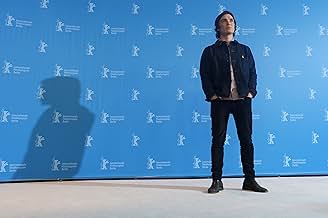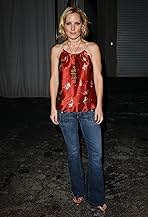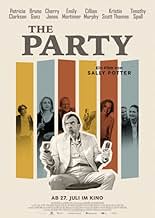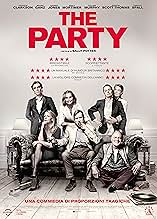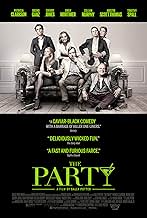Janet hosts a party to celebrate her new promotion, but once the guests arrive, it becomes clear that not everything will be going down as smoothly as the red wine.Janet hosts a party to celebrate her new promotion, but once the guests arrive, it becomes clear that not everything will be going down as smoothly as the red wine.Janet hosts a party to celebrate her new promotion, but once the guests arrive, it becomes clear that not everything will be going down as smoothly as the red wine.
- Director
- Writers
- Stars
- Awards
- 5 wins & 9 nominations total
- Director
- Writers
- All cast & crew
- Production, box office & more at IMDbPro
Featured reviews
'The Party (2017)', which tells the tale of a dinner party awkwardly gone awry, plays out in real time and relies solely on the dynamics between its seven core characters, who deliver dialogue that mostly does that debatably grounding and realistic thing of actually being about quote unquote 'nothing' - swapping Tarantino's signature pop-culture-spewing style with one that focuses on the main socio-economic and political views of modern Britain (issues which have their place and need to be talked about but are here almost used as filler). While it is fairly entertaining for the majority of its very short runtime, once you look back on the overall narrative it feels somewhat empty (and, dare I say, unnecessary), especially when you know where it leaves off and how many of its seemingly insignificant plot strands are simply left dangling. It's a darkly satirical piece and there are a few nice moments which stand out from the otherwise forgettable proceedings. It's also technically very well conceived, genuinely feeling like an encounter one might have at an unfortunate New Year's Eve party. 6/10.
The story of 'The Party' was unbeknownst to me upon my viewing of the film. All I knew was that it is directed by British Auteur Sally Potter and stars Kristen Scott Thomas, Timothy Spall and Cillian Murphy, which is the extent of context I will divulge here as I feel it is better to watch this film knowing very little about its narrative.
Although simplistic in its base narrative, underneath 'The Party' is a short, snappy, satirical view on the modern day socio-political climate. It paints the modern system of politics as ineffective at implementing change, suggesting a more immediate method is required in this day and age to keep up with such a rapidly changing world. The film succeeds and does this effectively through witty dialogue, articulately crafted Mise en Scene and a comedic narrative progression.
The narrative progression I refer to is the advancement of the characters into pure chaos after the guise of 'polite society' is stripped away, revealing the hypocrisy behind its ideals and presentation. This chaos is the crux of the film as it magnificently illustrates the futility of the mask that the upper class have created for themselves, which the film heightens through comedic elements giving the film a heavily satirical atmosphere.
Furthermore, the films caricatured characters play a crucial role in conveying the film's message as many of them are hypocrites, their real faces hiding behind the mask of what 'polite society' expects to see, with costume being cleverly utilised to convey to us the true thoughts and feelings of many of the characters whilst simultaneously acting as a red herring in some circumstances, illustrating how we cannot always know whether or not people are truly what they present themselves as, linking to another key message the film discusses: distrust in the political landscape.
However, although the film has a profound message, it suffers from being very simplistic on its surface. The story is cliché and predictable with a couple of drawn out dull moments, with the real meat of the film laying underneath, and whilst this is the case for most films, the surface has to be captivating at the same time in order to engage the audience. In this sense 'The Party' could be potentially divisive for audiences as the film runs the risk of appearing pretentious and dull for some viewers, which I can confirm as many left my screening of the film verbally disgruntled.
In conclusion, 'The Party' is an incredibly humorous, satirical take on modern day society's political landscape as well as the hypocrisy of 'polite society' and its bloated sense of self righteousness. Although it has its flaws, 'The Party' is a highly entertaining film with a punchy message that really sticks with you after you've left the theatre: indecision is the face of modern day politics, and that desperately needs to change.
Although simplistic in its base narrative, underneath 'The Party' is a short, snappy, satirical view on the modern day socio-political climate. It paints the modern system of politics as ineffective at implementing change, suggesting a more immediate method is required in this day and age to keep up with such a rapidly changing world. The film succeeds and does this effectively through witty dialogue, articulately crafted Mise en Scene and a comedic narrative progression.
The narrative progression I refer to is the advancement of the characters into pure chaos after the guise of 'polite society' is stripped away, revealing the hypocrisy behind its ideals and presentation. This chaos is the crux of the film as it magnificently illustrates the futility of the mask that the upper class have created for themselves, which the film heightens through comedic elements giving the film a heavily satirical atmosphere.
Furthermore, the films caricatured characters play a crucial role in conveying the film's message as many of them are hypocrites, their real faces hiding behind the mask of what 'polite society' expects to see, with costume being cleverly utilised to convey to us the true thoughts and feelings of many of the characters whilst simultaneously acting as a red herring in some circumstances, illustrating how we cannot always know whether or not people are truly what they present themselves as, linking to another key message the film discusses: distrust in the political landscape.
However, although the film has a profound message, it suffers from being very simplistic on its surface. The story is cliché and predictable with a couple of drawn out dull moments, with the real meat of the film laying underneath, and whilst this is the case for most films, the surface has to be captivating at the same time in order to engage the audience. In this sense 'The Party' could be potentially divisive for audiences as the film runs the risk of appearing pretentious and dull for some viewers, which I can confirm as many left my screening of the film verbally disgruntled.
In conclusion, 'The Party' is an incredibly humorous, satirical take on modern day society's political landscape as well as the hypocrisy of 'polite society' and its bloated sense of self righteousness. Although it has its flaws, 'The Party' is a highly entertaining film with a punchy message that really sticks with you after you've left the theatre: indecision is the face of modern day politics, and that desperately needs to change.
At first I did not like this little film but it grew on me. It's in black and white, sometimes harshly lit. The characters seem self-absorbed and not terribly interesting. And then Spall's character drops a bombshell that changes everything. There were quite a few laughs. Patricia Clarkson was especially good. Nice twist at the end. At just over an hour, it's a tight little diversion worth the small investment of time.
The middle-class dinner party in which the thin veneer of polite society is ripped away to expose the dog-eat-dog savagery underneath has provided ample fodder for playwrights since probably the birth of theatre, but films in which such a gathering is the sole focus are rarer. So step forward British auteur Sally Potter.
Having been appointed Shadow Minister for Health, Janet (Kristen Scott Thomas) and her husband Bill (Timothy Spall) throw a celebratory dinner party for their friends: the acerbic April (Patricia Clarkson) and (played by Bruno Ganz) her new age partner Gottfried ("prick an aromatherapist and you'll find a fascist" says April); lesbian professor Martha and her 'Masterchef' runner-up partner Jinny (Emily Mortimer), who is carrying their purchased foetuses ("babies are born every day, in large numbers - large enough to put our planet at risk" is April's unsentimental but accurate comment). Banker Tom (Cillian Murphy) arrives with his wife's apologies: she will be along later. Thus the stage is set, but when a champagne cork shatters a window it is an omen that this will be a dinner party none of the attendees will soon forget.
Trendy lefties who spend too much time thinking are an open goal when it comes to comedy, with their talk of 'post-post-feminism' and their professorships in Utopian Americanism, and Potter does not miss the target in her - I suspect affectionate - mickey-taking. There is nothing original in this - not even the 'twist' at the end - but the film is so entertaining that does not matter (with one exception: when banker Tom heads to the bathroom to snort cocaine I rolled my eyes - just once I would like to see a fictional young banker who *does not* have a coke habit: don't any of them simply put the kettle on?)
There is good acting all around: Clarkson gets all the best lines - albeit at the expense of depth of character - but that merely makes the others work harder with the lines they have been given. Thomas, whose character is the most fully-formed, is noteworthy.
At just over seventy minutes this is rather a short film. Quite why Potter decided to make it in black-and-white I do not know - extra filmsnob points I suppose. But it is hugely entertaining and I look forward to seeing it again. (After all, any film which lists in the credits 'production dog' *must* be good!)
Having been appointed Shadow Minister for Health, Janet (Kristen Scott Thomas) and her husband Bill (Timothy Spall) throw a celebratory dinner party for their friends: the acerbic April (Patricia Clarkson) and (played by Bruno Ganz) her new age partner Gottfried ("prick an aromatherapist and you'll find a fascist" says April); lesbian professor Martha and her 'Masterchef' runner-up partner Jinny (Emily Mortimer), who is carrying their purchased foetuses ("babies are born every day, in large numbers - large enough to put our planet at risk" is April's unsentimental but accurate comment). Banker Tom (Cillian Murphy) arrives with his wife's apologies: she will be along later. Thus the stage is set, but when a champagne cork shatters a window it is an omen that this will be a dinner party none of the attendees will soon forget.
Trendy lefties who spend too much time thinking are an open goal when it comes to comedy, with their talk of 'post-post-feminism' and their professorships in Utopian Americanism, and Potter does not miss the target in her - I suspect affectionate - mickey-taking. There is nothing original in this - not even the 'twist' at the end - but the film is so entertaining that does not matter (with one exception: when banker Tom heads to the bathroom to snort cocaine I rolled my eyes - just once I would like to see a fictional young banker who *does not* have a coke habit: don't any of them simply put the kettle on?)
There is good acting all around: Clarkson gets all the best lines - albeit at the expense of depth of character - but that merely makes the others work harder with the lines they have been given. Thomas, whose character is the most fully-formed, is noteworthy.
At just over seventy minutes this is rather a short film. Quite why Potter decided to make it in black-and-white I do not know - extra filmsnob points I suppose. But it is hugely entertaining and I look forward to seeing it again. (After all, any film which lists in the credits 'production dog' *must* be good!)
This is an odd little film, but I did enjoy it. For starters, it's only 71 minutes long, essentially the length of a typical streaming weekly drama offering. Additionally, it's shot (very nicely) in black and white, features a total cast of just seven actors (including a handful of very recognizable faces), and takes place wholly in one house using only about four shooting locations there.
This black comedy revolves around a joyful government promotion announcement and the unusual cast of characters that arrive at a small private gathering to celebrate. Conflicts abound and the very smart dialogue runs from politics to pregnancy to life coaching, much of it snarky, droll, and dripping with sarcasm (not all these people like each other; we soon learn why).
It was a quick and entertaining film. Had it gone much longer, it might have become tedious, but it didn't get there. If you're a fan of smart adult banter and personal interaction and intrigue, you'll probably like this. The great cast helps.
This black comedy revolves around a joyful government promotion announcement and the unusual cast of characters that arrive at a small private gathering to celebrate. Conflicts abound and the very smart dialogue runs from politics to pregnancy to life coaching, much of it snarky, droll, and dripping with sarcasm (not all these people like each other; we soon learn why).
It was a quick and entertaining film. Had it gone much longer, it might have become tedious, but it didn't get there. If you're a fan of smart adult banter and personal interaction and intrigue, you'll probably like this. The great cast helps.
Did you know
- TriviaThe majority of this movie was filmed sequentially.
- ConnectionsFeatured in Premios Goya 33 edición (2019)
- SoundtracksJerusalem
Performed by Fred Frith
Written by Hubert Parry
Arranged by Fred Frith & Sally Potter
Published by Copyright Control
- How long is The Party?Powered by Alexa
Details
Box office
- Gross US & Canada
- $749,827
- Opening weekend US & Canada
- $37,396
- Feb 18, 2018
- Gross worldwide
- $5,597,950
- Runtime
- 1h 11m(71 min)
- Color
- Aspect ratio
- 2.35 : 1
Contribute to this page
Suggest an edit or add missing content







